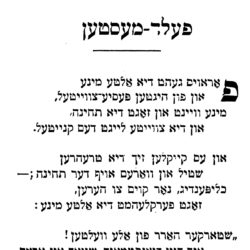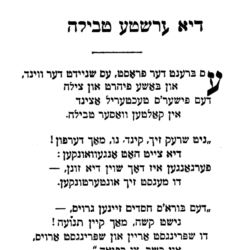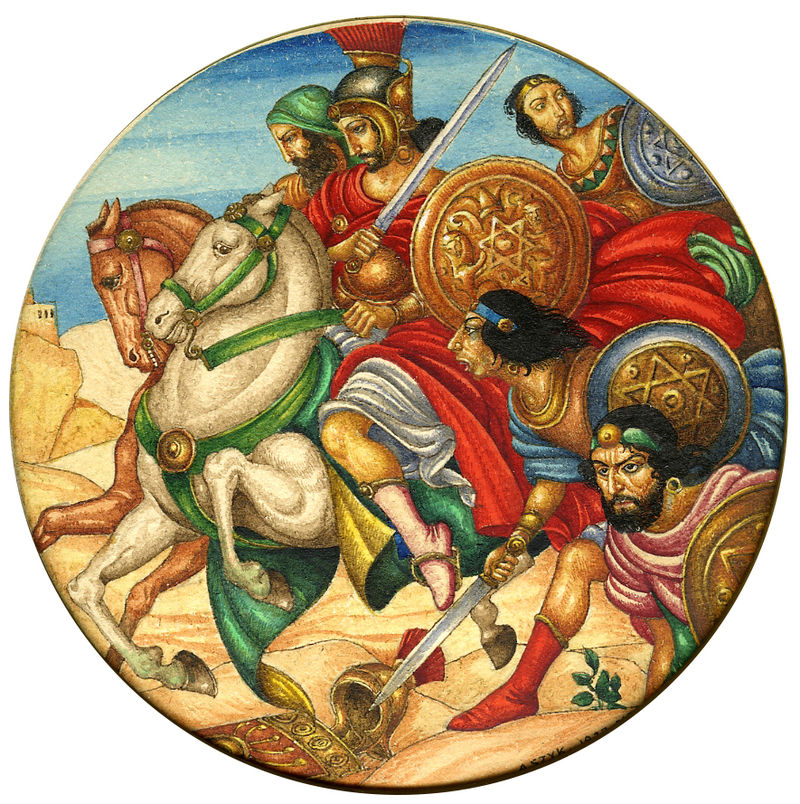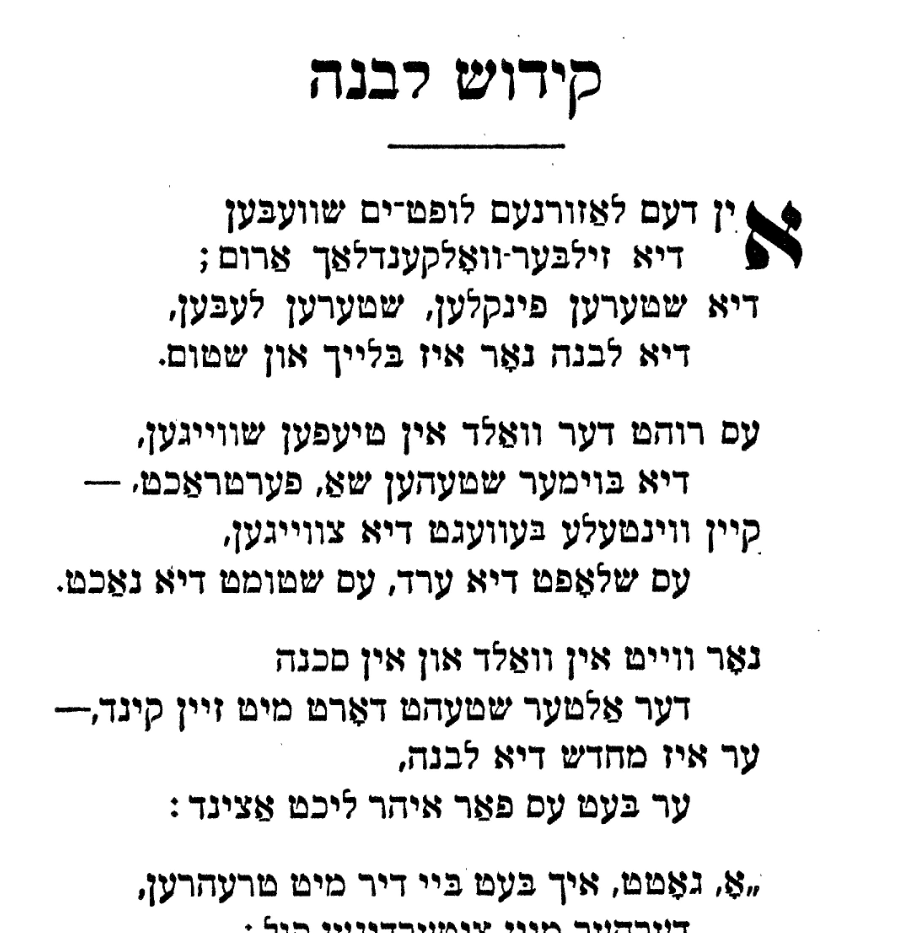TOGGLE COLUMNS (on/off):ADJUST COLUMN POSITIONS: select the column header cell and drag it where you want. show me!COPY INDIVIDUAL COLUMN(S): use CopyTables, a browser extension.
| Source (Yiddish) | 1898 Transliteration, Leo Wiener (Romanization) | 1898 Translation, Leo Wiener (English) |
|---|---|---|
קידוש לבנה |
Kidesch⸗Lewone |
The Moon-Prayer |
אין דעם לאַזורנעם לופט־ים שוועבּען א דיא זילבּער-װאָלקענדלאַך אַרום; דיא שטערען פינקלען, שטערען לעבּען, דיא לבנה נאָר איז בּלייך און שטום. |
In dem lasurnem Luft-jam scweben Die silberwolkendlach arum; Die steren fünklen, steren leben, Die L’wone nor if’ blēich un’ stumm. |
In the azure aerial ocean the silver clouds hover; stars twinkle, stars are merry, but the moon is pale and silent. |
עס רוהט דער װאַלד אין טיעפען שווייגען, דיא בּוימער שטעהען שאַ, פערטראַכט, — קיין ווינטעלע בּעוועגט דיא צווייגען, עס שלאָפּט דיא ערד, עס שטומט דיא נאַכט. |
Es ruht der Wald in tiefen schweigen, Die Bäumer stēhen scha, vartracht, — Kēin Wintele bewegt die Zweigen, Es schlāft die Erd’, es stummt die Nacht. |
The forest rests in deep silence; the trees stand hushed in meditation; not a breeze moves the branches, — earth sleeps, night is mute. |
נאָר ווייט אין װאַלד און אין סכנה דער אַלטער שטעהט דאָרט מיט זיין קינד, — ער איז מחדש דיא לבנה, ער בּעט עס פאַר איהר ליכט אַצינד: |
Nor weit in Wald un’ in ssakone Der Alter stēht dort mit sein Kind, — Er is’ mekadesch die Lewone, Er bet’t es far ihr Licht azünd: |
Only deep in the awful forest an old man stands with his child: he is blessing the moon and prays now for its light. |
„אַ, גאָטט, איך בּעט בּיי דיר מיט טרעהרען, דערהער מיין ציטערדיגען קול: עס זאָל איהר שיין פּערדאָפּעלט ווערען, זיא זאָל נאָך לייכטען וויא אַמאָל. |
„O, Gott, ich bet’ bei dir mit Trähren, Derhör’ mein zitterdigen Kol; Es soll ihr schein vardoppelt wer’en, sie soll noch leuchten wie a Māl. |
“O God, I pray to thee in tears, hear my trembling voice! Let its light be doubled, let it shine as of yore. |
„וויא דיין בֿעגלױבֿטער האָט געשריעבּען: — דיא גרויסע צווייא און גלייכע ליכט — זעה, גאָטט, ווי בּלייך זיא איז געבּליבּען, קוק אָן איהר שטערבּליכעס געזיכט!” |
„Wie dein Begläubter hāt geschrieben: — Die grōße zwēi un’ gleiche Licht, — O, Gott, wie blēich is’ sie geblieben, Kuck ān ihr sterbliches Gesicht!“ |
“As thy Trusted one has written: the two great and equal lights! O God, how pale it has become, look at its mortal face!” |
אָ, וויא צוקלינגט זיך עס אין שטילען, אין טיעפען װאַלד, זיין היים געבּעט! וויא גיסען זיך דאָס דיא געפיהלען! וויא שווייגט דאָס אַלעס, ווען ער רעדט! |
O, wie zuklingt es sich in stillen, In tiefen Wald, sein hēiß Gebet! Wie gießen sich dās die Gefühlen! Wie schweigt es Alles, wenn er red’t! |
Oh, how his warm prayer resounds in the silence of the deep forest! How his feelings flow! How all is silent when he speaks! |
זיין קינד נאַר קוקט, ווער קען ערקלערען, װאָס אױבּען, אין דעם בּלויען ים עס גלאַנצען מאַנכע העלע שטערען, און מאַנכע שמינקלען, שמינקלען קאַם? |
Sein Kind nor kuckt, wer känn erklären, Wās ōben, in dem blauen Jam, Es glanzen viele helle steren, Un’ manche schmünklen, shmünklen kam? |
His child looks on and wonders why above, in the blue ocean, many stars are shining bright, while some barely, barely twinkle? |
דאָס קלוגע קינד בּעטראַכט עס אױבּען און פרעגט דעם אַלטען ניט געשטערט: „אַ, זאָג דאָך, פּאַטער, מעג מען גלױבּען אין דעם, װאָס איך האָבּ אָפט געהערט? |
Dās kluge Kind betracht es ōben Un’ frägt dem Alten, nit gestört: „O, sāg’ doch, Vāter, mäg men gläuben In dem, wās ich hāb’ oft gehört? |
The clever child looks on high and, without being interrupted, asks his father: “Oh, tell me, father, can we believe that which I have often heard? |
„מען זאָגט דעם רייכענס שטערען פינקעלט, איז אימער העל, איז שטענדיג גרויס, דעם אָרעמאַנס פערקעהרט, ער דינקעלט, פערלעשט זיך, לעשט זיך און געהט אויס |
„Men sāgt, dem Reichen’s steren fünkelt, Is’ immer hell, is’ ständig grōß, Dem Āremen’s varkehrt, er dünkelt, Barlöscht sich, löscht sich un’ gēht äus, |
“They say the rich man’s star sparkles, is always bright, always large, while the poor man’s star grows dimmer, dimmer, and finally goes out? |
„און זיינען טאַקע דאָ מזלות אין הימעל? זאָג דאָך, יאָ צו ניין? בּעצייכנען זיי אי רוה, אי גלות, אי פרייד, אי עלענד, אי געוויין ? |
„Es seinen take dā Masoles O dorten? sāg’ doc, jā zu nēin? Bedeuten see i Ruh’ i Goles, I Frēud’, i Elend, i Gewēin? |
“Are there, indeed, stars of destiny above? Tell me, yes or no? Do they stand for peace and oppression, pleasure, misery and weeping? |
„אָ, זעסט דאָרט יענעם קליינעם שטערען? איז ער ניט אונזער מזל? זאָג! ווייל שטענדיג וויינען מיר מיט טרעהרען און טרויריג איז אונז יעדער טאָג…. |
„On sehst dort jenem Heinem steren? Is’ unser Masel er nit? sāg’! Weil unser Leben trieft nor Trähren Un’ finster is’ uns jeder Tāg. . . . |
“Do you see over yonder the small star? Is it not ours? Tell me! For our life is heavy with tears, and all our days are dark. |
„און קען עס זיין, אז ער זאָל גלאנצען וויא יענע נאָך אין גאָלדנעם פּראַכט? צי לעשט איהם גאָטט דאָרט אויס אין גאַנצען און װאַרפט אַרױף אויף איהם דיא נאַכט?” |
„Un’ känn noch sein, as er soll glanzen, Wie jene dort, in gold’nem Pracht? Zu löscht er sich dās aus in Ganzen, Auf ēbig deckt ihm zu die Nacht?“ |
“And can it be that it will shine some day like those others, in golden splendor? Or will it entirely go out, and will eternal night cover it?” |
דער אַלטער קנייטשט זיין הויכען שטערען, ער קלערט א תירוץ פיר זיין קינד, — עס קומען זיפצען, קומען טרעהרען, דאָך ווערטער ניט אַזױ געשווינד…. |
Der Alter kneetscht dem hōchen steren, Er klärt an Entfer far dās Kind, — Es kummen süfzen, kummen Trähren, Doch Wörter nit asō geshwind. . . . |
The old man wrinkles his high brow and thinks of an answer for the child; there come sobs, there come tears, but words are late in coming. . . . |
This is the poem “קידוש לבנה” by Morris Rosenfeld (1862-1923) written sometime before 1898. (If you know the date of the earliest publication of this poem, please leave a comment or contact us.) We have transcribed the poem as it was published in Rosenfeld’s collection of poems Gezamelṭe lieder (1906) pp. 141-143. The poem was romanized and translated into English by Leo Wiener and published under the title, “Kidesch⸗Lewone (The Moon-Prayer)” in Songs from the Ghetto (1898), pp. 48-53. I have set these all side-by-side for the first time. –Aharon Varady
Source(s)



“קידוש לבנה | Kidesch⸗Lewone | The Moon-Prayer, a prayer-poem by Morris Rosenfeld (before 1898)” is shared through the Open Siddur Project with a Creative Commons Attribution-ShareAlike 4.0 International copyleft license.










Comments, Corrections, and Queries